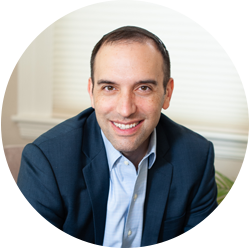Dear Friends,
As Jeremy Burton put it in the title of his important blog post last week, we can't stop talking about antisemitism.
This week was the anniversary of the Tree of Life shooting in Pittsburgh, the worst act of antisemitic violence ever on American soil. We remember the 11 victims and keep their memory and their families in our hearts.
Meanwhile, antisemitism is all over the news. Last week, an outrageous incident occurred in which the D.C. chapter of the Sunrise Movement (an environmental advocacy group) singled out and excluded progressive Jewish groups from a voting rights coalition, prompting seemingly unanimous, across-the-board condemnation and an apology, even from the Sunrise Movement itself. The American Jewish Committee (AJC) just released its State of Antisemitism in America 2021 report, which is already receiving a flurry of analyses and responses.
Earlier this week, I had the privilege of interviewing Professor Deborah Lipstadt, President Biden’s nominee to be the State Department Special Envoy to Monitor and Combat Antisemitism. More than 750 people attended the Zoom event, the first in a speaker series titled Bold Conversations, during which Professor Lipstadt reviewed the history of antisemitism. She emphasized the importance of calling out antisemitism from wherever it comes, even though it is easier to comdemn antisemitism when it comes from the political side with which we disagree. She reflected on the disturbing trend of students on college campuses thinking twice about expressing their Jewish identities, or at least their support for Israel, especially in progressive spaces. While we could not record the event, you can read about our conversation.
A friend remarked that Professor Lipstadt has a way of addressing a depressing topic with a positive and upbeat demeanor that inspires us to stay proactive and proud, even while facing difficult challenges with no simple solutions. She writes in her book, Antisemitism: Here and Now — and reiterated this week — that we should not focus on “the oy” at the expense of “the joy.”
I am proud that our community takes this to heart. My predecessor, Barry Shrage, has always focused on Jewish renaissance over fear-based continuity. We will continue to invest in building a vibrant, diverse, engaged community where everyone, especially our next generation, can develop and proudly express strong, positive, joyful Jewish identities. At the same time, we will do so with eyes wide open about the realities we face, including the need to better understand, name, and fight against Jew-hatred in all its forms.
In what felt to me more like providence than coincidence, my conversation with Professor Lipstadt took place just as we were beginning to commemorate the first yahrzeit (anniversary of the passing) of Lord Rabbi Jonathan Sacks (z”l), whose teachings and wisdom have inspired so many in our community and around the world.
Professor Lipstadt’s emphasis on “the joy” reminded me of Rabbi Sacks’ commentary on this week’s Torah portion, Chayei Sarah, from two years ago, entitled “To Have a Why.” Reflecting on how Abraham and Sarah stayed positive in the face of so many challenges and unfulfilled dreams, he cites the remarkable teachings of two Holocaust survivors, Edith Eger and Victor Frankl. They write about what has come to be called positive psychology — our human capacity to choose positivity and hope rather than victimhood. While we can be victimized from the outside, they suggest, we become victims when choose to hold onto and then build an identity around our victimization.
I believe that Professor Lipstadt and Rabbi Sacks want us to find ways to talk about and fight antisemitism with courage and pride, not victimhood. Our challenge is not to let those who hate us or even try to destroy us define us. Rather, like these heroic survivors teach us, we can strive to find a higher purpose, a personal and collective “why,” that motivates us see and keep working for goodness and possibility; to, in the inimitable words of Rabbi Sacks, contribute our Jewish voices of hope to the conversation of humankind.
Shabbat Shalom,
Rabbi Marc Baker

About the Author
CJP President and CEO Rabbi Marc Baker is an educator, writer, and leadership mentor who is devoting his life to Jewish learning and building Jewish communities.
